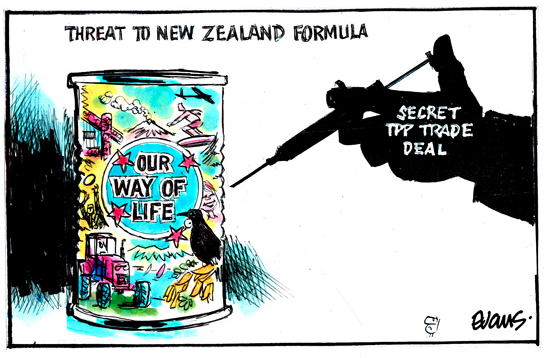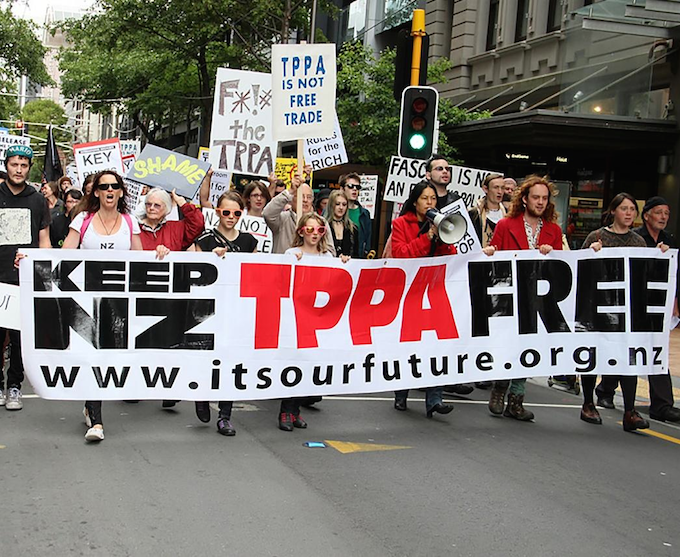ANALYSIS: By Professor Jane Kelsey
It is now certain that any decisions on the future of the Trans-Pacific Partnership Agreement (TPPA) minus the US will take place after New Zealand’s general election this month.
Last week’s meeting of the negotiators from the remaining 11 TPPA countries rebuffed the National government’s wish to proceed with the agreement basically unchanged aside from new provisions for its entry into force.
 They have all agreed to suspend (but not remove) some of the most controversial intellectual property provisions that hiked the price of medicines. Other countries want parts of the actual text and countries’ schedules reopened.
They have all agreed to suspend (but not remove) some of the most controversial intellectual property provisions that hiked the price of medicines. Other countries want parts of the actual text and countries’ schedules reopened.
Each country has to come back with its wish-list at another meeting in Japan later this month, probably while the New Zealand government is in caretaker mode after the September 23 election.
Post-election, a Labour-led government would inherit a poisoned chalice. But its position to date gives no confidence that Labour will take a stand against the resurrection of the deal, despite the groundswell of opposition from its own core membership.
READ MORE: Response of the opposition parties to the 10 bottom lines for NZ’s future trade policy

Labour Party leader Jacinda Adern recently defended the party’s “bloody minded” opposition to the agreement. But its only firm position is an objection to a single, very specific provision in the entire 30-chapter deal: the right to discriminate against foreign purchasers of residential property in the schedule on investment.
Does Labour really intend to agree to the TPPA-11 if that minor matter is changed (as it has been in a leaked copy I have of New Zealand’s proposed schedule to the now-suspended Trade in Services Agreement negotiations)?
Hiking the price of medicines
What about the intellectual property provisions the US insisted on that will hike the price of medicines and put taxpayer money into the pockets of Big Pharma – money Labour will desperately need to upgrade our rundown hospitals and fund primary health care for our poorest communities?
To date they will be suspended, but not removed, so they can be reactivated if the US rejoins. If the New Zealand Medical Association can call for those rules to be dropped, surely it’s a safe enough bet for the Labour Party to do so?
Or the investor-state dispute mechanism. David Parker’s position is that Labour would prefer not to have them. Grow a spine! Even Crawford Falconer, the ex-MFAT official who is now the UK’s new free trade negotiator, says it should be dropped from such deals.
Parker also insists that the Treaty of Waitangi exception is the best possible drafting imaginable, and claims the Waitangi Tribunal endorsed it. In fact the Tribunal said:
“The Crown however goes further and says that nothing in the TPPA will prevent the Crown from meeting its Treaty obligations to Māori. We have some reservations about this. … Our concern is that by qualifying the Treaty exception clause to that aspect of the Treaty relationship which may allow the Crown to adopt or implement measures more favourable to Māori, the full constitutional reach of the Treaty relationship may not be as clearly protected and preserved under the TPPA as it might be.”
A Labour Party that is pitching to reclaim all the Māori seats can, and must, do better.
So far as I can see, Labour has not even called for the government’s new modelling on the TPPA-11 to be made public, despite having pointed to the failings of the initial modelling in its minority report on the original TPPA.
Leadership on record
Labour’s leadership needs to go on record before the election with some more detailed and convincing answers to these questions, and its position on other toxic provisions affecting the right to regulate on state-owned enterprises, government procurement, financial services and taxation.
Above all, Labour needs to commit now to a genuine consultation about what position New Zealand should take on the TPPA-11 (given the massive input into the original select committee hearing that was arrogantly ignored); to publish any future mandate it takes into the negotiations (as the EU does in its negotiations); and to support its position with a comprehensive, independent and public cost-benefit analysis.
Or does Labour intend to retreat behind the same wall of secrecy as National has in these renegotiations?
Jacinda Ardern, Grant Robertson, David Parker, anyone in the Labour leadership – can we know your real position on the TPP-11 before the election please?
Dr Jane Kelsey is a professor of law at the University of Auckland and a prominent New Zealand critic of globalisation. This article is republished from The Daily Blog with permission.














































